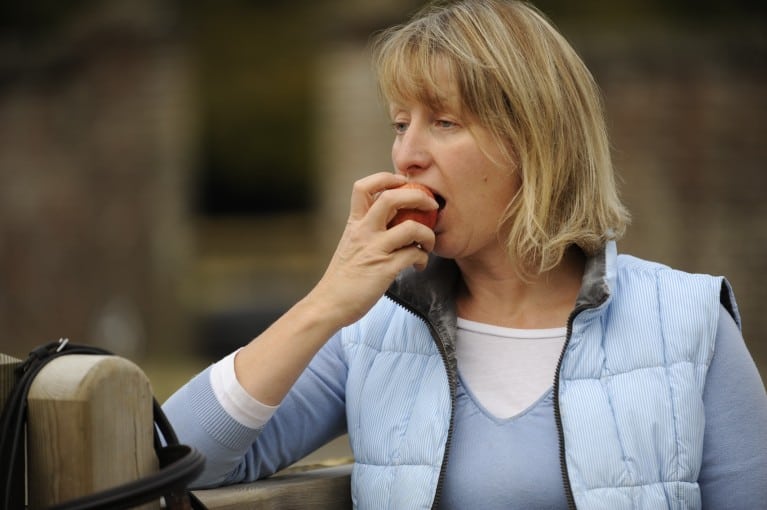Eat yourself fit. Become a healthier, happier horse rider with these simple diet rules
Posted in Riding Schooling and Training Fitness
We all want to be fit enough to keep up with our horses, but the first thing we need to look at is our diet.

In the February 2013 issue of Horse&Rider magazine, we asked Matt Luxton, the personal trainer behind the award-winning Equestrian Athlete Plan, what we should be eating to perform at our best.
To support that feature, here are some tips for choosing the right foods to get the best results. You can download Matt’s Equestrian Athlete Plan in full for £23.99 from www.theequestrianathleteplan.com.
Remember to consult your doctor before you make any changes to your diet.
The key food groups
Slow-release carbohydrates
Choose slow-release sources of carbohydrates, such as sweet potato or brown rice, which will keep your blood glucose relatively level and reflect in your performance and mood.
Protein
Protein is a major structural and functional part of our body’s cells. It provides about 10-15% of our dietary energy, and is needed for growth and repair. Not all protein can be stored in your body, so you need a daily intake from your food. You can get your protein from animal sources (chicken, eggs, fish) and non-animal sources (nuts, such as almonds, or pumpkin or sunflower seeds).
Fruit and vegetables
By eating whole, fresh foods, your body will become far more efficient at absorbing all the nutrients you need. Making the most of your energy starts from the inside out.
Water
Dehydration has an impact on brain function (see below).
Sugary snacks
Eating sugary processed foods, like biscuits, sweets or cake, lead to more insulin being released into your blood to remove the sugars. This causes a yo-yo effect, where you have a burst of energy, then crash. You then reach for more sugar, which gives another temporary boost, followed by another crash.
Processed food/ready meals
Processed foods increase your body’s ability to store water and fat. Storing water is what causes bloating, as your body becomes effective at diluting the bad things you have eaten. Ready meals will impact your ability to absorb valuable parts of the food, too. If it comes in a packet, try to avoid eating it.
Milk, cheese and butter
Dairy products in the UK are not as nature intended as they go through the pasteurisation process, which can reduce the calcium levels. In fact, if you want to boost your calcium, you will get more from leafy vegetables than milk. For probiotic benefits, eat organic low-fat natural yogurt.
Alcohol and caffeine
Steer clear – they are nutrient robbers. Alcohol and caffeine will affect your energy levels, reduce your digestive capacity and upset your mental function. Try Tulsi tea or Red Bush tea instead – they are full of powerful anti-oxidants and can help reduce stress, too.
Good food list
Proteins, Fruit and Veg. Fats, Miscellaneous
Whole organic eggs
Free range chicken,
duck, pheasant
Free range turkey
Grass fed beef, buffalo,
lamb, venison
All wild fish
Raw almonds, walnuts,
macadamia nuts,
filberts, pecans,
pumpkin seeds,
sunflower seeds
Raw nut butters from
the above nuts
All vegetables
(although don’t
overload on potato)
All fruits (not canned)
Brown rice
Quinoa
Cold pressed extra
virgin olive oil
(Preferably raw)
Organic butter (not margarine)
Coconut oil
(organic, extra virgin)
Organic peanut butter
All spices
Sea salt (no other salt)
Herbal teas
Black pepper
Vegetables, sprouts, nuts and seeds, Fruit, oils, grasses, grains and beans
Asparagus
Broccoli
Chilli
Capsicum/Pepper
Courgette/Zucchini
Dandelion
Snow peas
Green Beans
String Beans
Runner Beans
Spinach
Kale
Wakame
Kelp
Collards
Chives
Endive
Chard
Cabbage
Sweet Potato
Coriander
Basil
Brussels Sprouts
Cauliflower
Carrot
Beetroot
Aubergine
Garlic
Onion
Parsley
Celery
Cucumber
Watercress
Lettuce
Peas
Broad Beans
New Potato
Pumpkin
Radish
Kamut
Quinoa
Radish
Spelt
Soy
Alfalfa
Amaranth
Broccoli
Fenugreek
Almonds
Coconut
Flax Seeds
Pumpkin Seeds
Sesame Seeds
Sunflower Seeds
Avocado
Tomato
Lemon
Grapefruit
Fresh Coconut
Avocado
Coconut
Flax
Olive
Wheatgrass
Barley
Kamut
Dog Grass
Shave Grass
Oat
Amaranth
Buckwheat
Brown Rice
Chia/Salba
Kamut
Millet
Quinoa
Spelt
Lentils
Lima Beans
Mung Beans
Navy Beans
Pinto Beans
Red Beans
Soy Beans
White Beans















